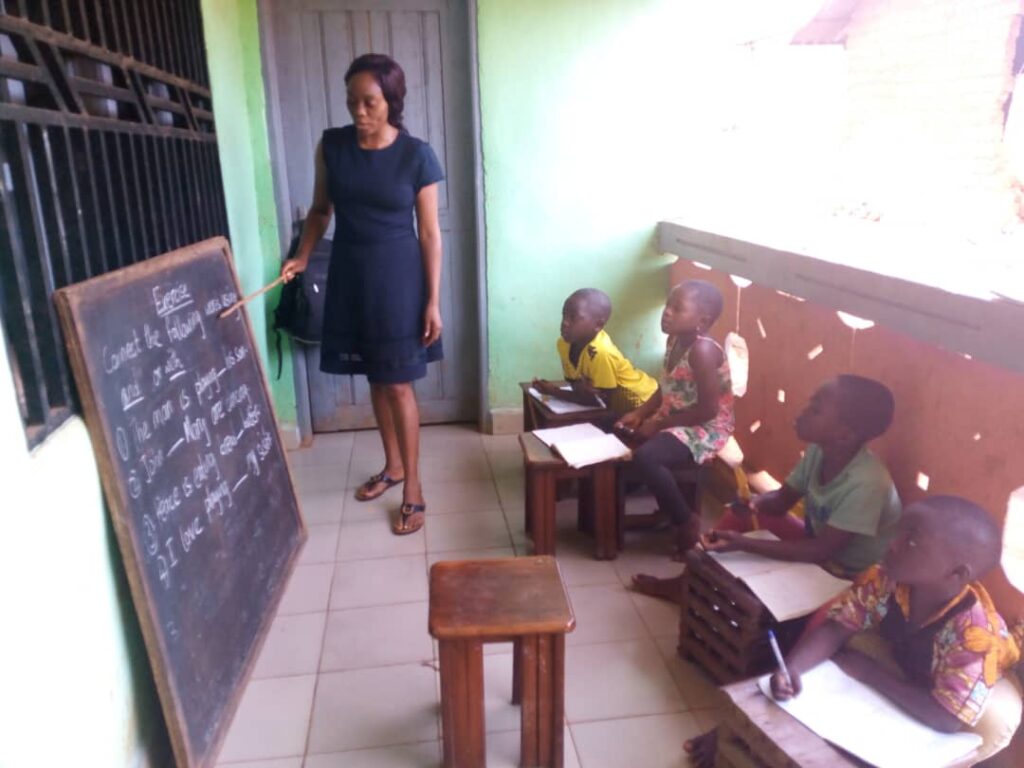
Executive summary
Education stands out as one of the fundamental rights of every child. It further shapes and acts as a major determinant to the future of every child. The children at elementary level in Bali Nyonga just like most other communities in the Anglophone regions have been deprived of learning since the start of the political crises in October 2016. Heightened insecurity from the crises resulted in the closure of schools leaving elementary school children stranded at home especially those from vulnerable families with no financial means to relocate. The effects of this have become the tendency of teenage boys joining the armed groups (child soldiers) fighting against government forces, and also young girls getting unwanted pregnancies. To prevent such extreme consequences, there was the need to find a way to engage the children in education to shape their future in a better direction.
Six months back, the community in a joint effort created 2 learning centres to carter for the educational needs of children at elementary level (class 1-6). These centres are managed by the community and have benefitted from assistance of HOCI volunteers. HOCI was interested in Bali because of the efforts made by the community to encourage learning among children.
Most children due to distance from the learning centres however still do not have access to education. The community-Home learning program was initiated to offer learning opportunities to these children who do not have access to the learning centres. HOCI community volunteers therefore visit these neighbourhoods, assemble the children on bi-weekly basis and give lessons.
CONTENT OF ACTIVITIES, RESULTS AND OUTCOME OF ACTIVITY
Content of activities
Recruited skilled local community volunteers are very much at the forefront of the project. HOCI works closely with professionally trained teachers who have been left jobless for over four years of the Anglophone crises. These volunteers have been more than willing to assist in the project of offering education to children in the locality.
The most remarkable community volunteer is Nahkuna Ruth.
Nahkuna Ruth is a State Registered Nurse by profession. Within her three years in the University, she was a part time home tutor for different children at elementary and secondary level of education in Yaounde between 2006 -2009. In 2010 she became a full time teaching staff with a private elementary institution in Yaounde. After graduating from nursing school with a certificate as a State registered Nurse, she worked as a Paediatrician with the Baptist Health Service, Mbingo. Because of the intensity of the crises and the inability of the hospital to retail all of its workers, she has been on technical leave for over two years now. She spends most of her time in Bali Nyonga sub division of the North West Region of Cameroon where she originates. Nahkuna Ruth has been the principal volunteer working for HOCI using her teaching skills to empower children in Bali Nyonga at the elementary level. She is a humanitarian and offers assistant even to adult
Project results
- At least 75 children in Bali Nyonga have been benefiting from the services of the community volunteer teachers.
- The activity has reduced the possibility of teenagers to become child soldiers in the context of the violent crises. The volunteer teachers educate the children especially the young boys on the voice of peace and negative effects of violence.
- It has been a form of employment for Community volunteer teachers who receive a monthly allowance for their upkeep
- It has improved the moral of children while securing a better future for them. Volunteer teachers have been trained on good morals which they pass on to children in lessons
Challenges and difficulties faced
- Limited number of community volunteer teachers
- Financial difficulties to manage the volunteer team
- Inadequate learning materials such as chalk, text books and others
- Poor time management by some parents to prepare their children before lessons especially during the farming season
- Insecurity and gunshots sometimes makes it impossible for volunteer workers to offer lessons
Conclusion
Considering the progress made so far with the program, HOCI is considering raising funds through a complete project proposal to be able to reach out to more children in the neighbourhood and to ensure better learning conditions for these children. HOCI also intends to introduce learning using digital tools and devises such as USB keys and where lessons can be shared with children in different neighbourhoods to follow on television and smart phones.
